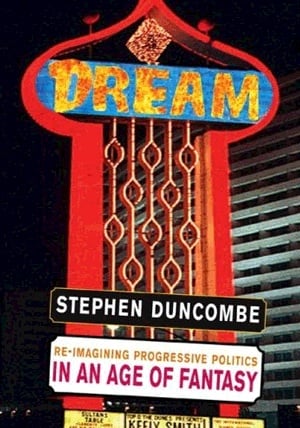Grand Theft Politics
By:
September 5, 2011

On June 12, 1982, my mother and I took a train from Boston to New York, joining nearly a million other Americans who’d turned out to protest the nuclear arms race. In front of United Nations headquarters, we were coached to sing “Give Peace a Chance” and brandish signs (I’d stapled a Star Wars fan club-issued photo of Yoda to mine). Then we were shepherded to Central Park, where we listened to Dr. Spock and Carly Simon. It was at the time the largest political demonstration in U.S. history, but despite my youthful idealism, the rally failed to engage me. I remember thinking, “This rally is lame — and that’s why it’s not going to change a thing.” I was 14, and I was absolutely correct.
[This essay was first published by Slate, on April 3, 2007.]
At the time, many Democrats felt the same way. After Reagan’s re-election, the Democratic Leadership Council was formed to unburden the Democrats of their ’60s-style ideological baggage. The New Democrats borrowed planks from the Republican platform and eschewed Dionysian spectacles like large peace rallies in favor of studying, lobbying, and regulating. Throughout the 1990s, Apollonian progressive figures such as Joe Lieberman and Tipper Gore tut-tutted about rap music, violent video games, and action movies without pausing to reflect on why suburban middle-class youth might enjoy those phenomena. Our leaders seemed out of touch, even inhuman.

In a new book, Dream, NYU media professor and political activist Stephen Duncombe laments that progressives have become… well, tedious. The people who built the New Deal and led the civil rights struggle are now engaging in old-fashioned, top-down political practices. These days, whether you attend a rally, sign a petition, or forward a MoveOn e-mail, it can be a disempowering experience. Duncombe is not contemptuous of the traditional anti-war demonstrations against Iraq, but, he argues, obscured within these and other well-intended political actions is “a philosophy of passive political spectatorship: they organize, we come; they talk, we listen.”

Worse, today’s progressives fail to tap into America’s collective unconscious through spectacle, which Duncombe defines as “a way of making an argument… through story and myth, fears and desire, imagination and fantasy.” Republican Party leaders don’t hesitate to derive inspiration from Madison Avenue and Hollywood. George W. Bush’s “Mission Accomplished” photo-op may have backfired, but it demonstrated an impressive commitment to spectacle. In this way, Republicans are actually far more populist than the New Democrats.
If progressives ever want to set the national agenda, Duncombe insists, they must embrace what he calls dreampolitik, a politics that “embraces the dreams of people and fashions spectacles which give these fantasies form.” With the exception of street activists at the far fringes — he praises Billionaires for Bush, Critical Mass, and Reverend Billy and the Church of Stop Shopping — progressives remain convinced that “their sense of superior seriousness will win debates, convince the public, and lead them back into the halls of power.” Talk about fantasy! Witness the last presidential race, when stagecrafted spectacles that associated President Bush with military prowess trumped the sober-sided efforts of John Kerry to win debates and votes.

It wasn’t always thus. Duncombe points to a “counterhistory of the left that has long embraced the dreamscape of the imaginary, using symbolism and narrative in an attempt to create new realities.” Rosa Parks, for example, wasn’t an average citizen acting spontaneously when she refused to move to the back of the bus: She was a professional organizer who knew exactly what she was doing. But what’s more important, demands Duncombe: the history lesson or the myth?

Duncombe notes approvingly how the Yippie activist Abbie Hoffman pursued an “explicit strategy of mythmaking” when he dreamed up the mock-serious levitation of the Pentagon during a massive, though otherwise run-of-the-mill, anti-war rally in 1967. In our current moment, Michael Moore’s documentaries may not be fair and balanced, but they make us laugh and cry, and they also sell tickets. The once buttoned-up New Democrat Al Gore doesn’t rate a mention in Dream, which was written before An Inconvenient Truth, but he’s obviously learned some new tricks.

So, how might today’s progressives develop an alternative political aesthetic? Duncombe suggests that Democrats co-opt and transform the fantasies against which they have for so long inveighed. He urges progressive activists, for example, to study video games like Grand Theft Auto. Doesn’t the game’s popularity blatantly indicate that many of us fantasize about carjacking and other violent crimes? Yes, it may, admits Duncombe, before drawing a more optimistic conclusion. “If a game offers power, excitement, and the room to explore, people will play evening after evening after evening, almost regardless of the results,” he writes. “Perhaps the problem is not that people don’t want to get involved in politics, but rather that they don’t want to take part in a professionalized politics so interested in efficiency that there is no space for them, or they don’t want to spend time in a political world so cramped that there’s no freedom to explore and discover, to know or master.” Which brings us back to where we started: How can progressives invent a political process that figuratively and literally involves us?

Duncombe’s answer is something he calls the “ethical spectacle.” Unlike the unethical kind of spectacle, which conceals a rotten state of affairs, and which demands passivity and acquiescence from spectators, an ethical spectacle promotes progressive ideals of egalitarianism and inclusivity. It models at the level of form what progressive politicians promise in the content of their speeches: demonstrating the ideals of its participants, none of whom are relegated to the role of sign-toting spectator. Duncombe, slipping into hortatory mode, makes some grand predictions about the progressive movement of the future: “Our spectacles will be participatory: dreams the public can mold and shape themselves,” he claims. “And they will be transparent: dreams that one knows are dreams but which still have power to attract and inspire.” This is not a wake-up call — what Duncombe asks of progressives is to dream better.
READ MORE essays by Joshua Glenn, originally published in: THE BAFFLER | BOSTON GLOBE IDEAS | BRAINIAC | CABINET | FEED | HERMENAUT | HILOBROW | HILOBROW: GENERATIONS | HILOBROW: RADIUM AGE SCIENCE FICTION | HILOBROW: SHOCKING BLOCKING | THE IDLER | IO9 | N+1 | NEW YORK TIMES BOOK REVIEW | SEMIONAUT | SLATE
Joshua Glenn’s books include UNBORED: THE ESSENTIAL FIELD GUIDE TO SERIOUS FUN (with Elizabeth Foy Larsen); and SIGNIFICANT OBJECTS: 100 EXTRAORDINARY STORIES ABOUT ORDINARY THINGS (with Rob Walker).
